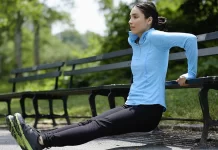Every single day we are exposed to bacteria, viruses, fungi and parasites. Your work desk, your vehicles, even your hand phone are germ jungles. The most common invaders are upper respiratory tract invaders or URTI’s, which hit you with colds, coughs, flu, sinusitis, tonsillitis, throat infections and middle-ear infections.
Indonesia is now entering the transition period from rainy season to dry season. If you don’t have good immunity, you can get cold or flu easily. When you have a cold or flu, should you “sweat it out” with exercise or just stay at home and recover? When it’s okay to work out while you’re sick, and when you shouldn’t?
The general rule of thumb about whether to exercise when you’re sick is the “above and below the neck check” – If you have symptoms above the neck, like coughing, sneezing, sore throat, or nasal congestion, you can probably still work out. If you have symptoms below the neck like chest congestion, aches, vomiting, or fever, it’s best to skip the exercise.
Although we would like to suggest that its best to exercise at home if you have a cold and NOT at the gym/fitness center, to avoid infecting other people.
Should you exercise while sick?
There is a difference between “working out” and “physically moving the body”. A structured workout routine—one which you’re breathing heavily, sweating, working hard and feeling some discomfort—awakens the stress response in the body. When you’re healthy, your bodies can easily adapt to that stress. But when you’re sick, the stress of a tough workout can be more than your immune system can handle.

So, during the first few days of sickness, low-intensity, low-heart-rate cardio are recommended. Walking, low-intensity biking, tai chi, jogging, and yoga shouldn’t hurt you (unless you’re severely out of shape). These activities aren’t intense enough to impose serious immune-compromising stress on the body. They’ve even been shown to boost the body’s ability to fight illness. Still, if you feel like you need rest, don’t push yourself.
Prolonged vigorous exercise, on the other hand, can make us more susceptible to infection. For example, running a marathon can depress your adaptive immune system for up to 72 hours. So, it makes sense to avoid that when you’re sick.

Your strength and performance will likely be diminished while you’re battling a cold, and thus putting you at increased risk for injury while trying to lift heavy equipment. The muscle strain required to lift weights also can cause sinus pressure and headaches to feel even worse. If you still do not want to skip a strength workout, you can do it at home, where you won’t be spreading germs and sharing your sickness with other weight lifters.
The key rule
If you do choose to exercise when you’re sick, regardless of what kind of exercise you choose, reduce the intensity and length of your workout. If you attempt to exercise at your normal intensity when you have more than a simple cold, you could risk more-serious injury or illness.




